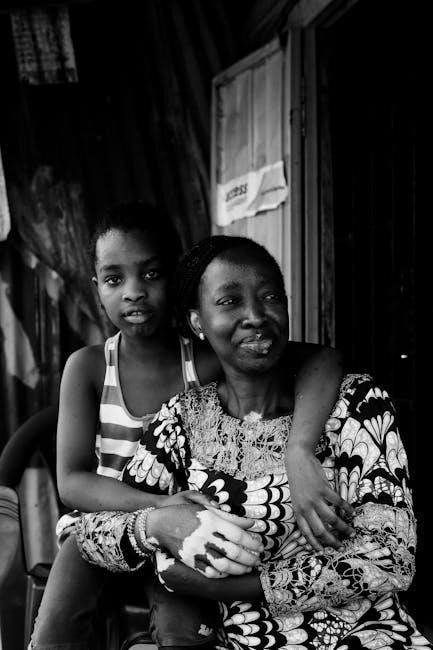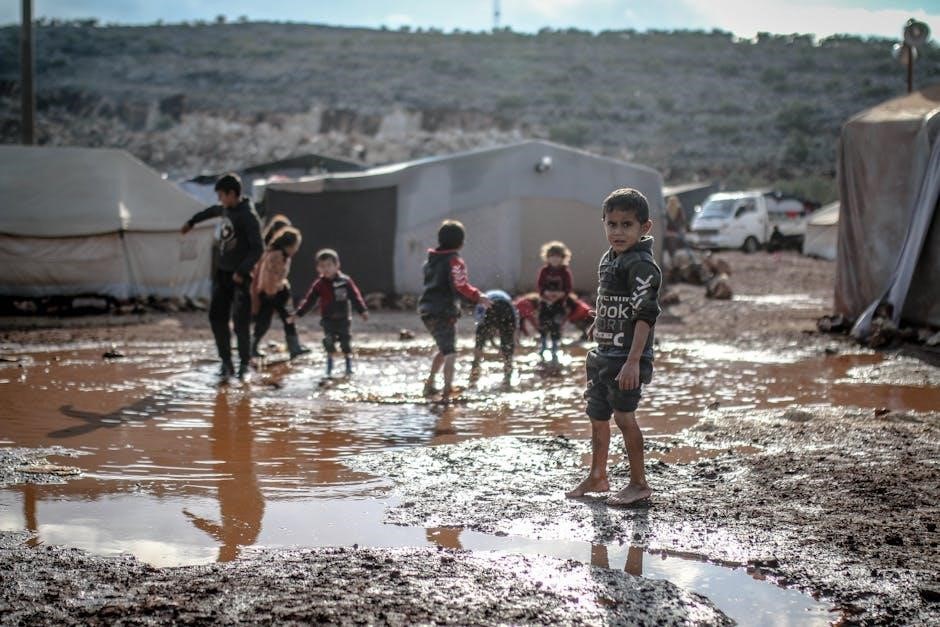family life now 3rd edition pdf

The third edition explores modern family dynamics, offering insights into communication, conflict resolution, and forgiveness. Published by SAGE Publications, it’s available in PDF, Kindle, and ePub formats.
Overview of the Book
Family Life Now 3rd Edition by Kelly J. Welch is a comprehensive guide to understanding modern family dynamics. It explores family communication, conflict resolution, and forgiveness, while addressing gender roles and diversity in family structures. The book is designed to help individuals and families assess their situations and navigate challenges. Published by SAGE Publications, it is available in PDF, Kindle, and ePub formats, making it accessible for various learning preferences and needs.
Publication Details
Family Life Now 3rd Edition is published by SAGE Publications, Inc. The book was released on January 25, 2021, and features ISBN-10: 1544371020 and ISBN-13: 978-1544371023. It is available in both print and digital formats, including PDF, Kindle, and ePub. The digital versions are accessible for convenient reading across devices, catering to diverse learning and reference needs. The publication is part of a series aimed at providing insights into contemporary family studies.
Key Features of the 3rd Edition
The 3rd edition of Family Life Now offers updated research and real-world applications, enhancing understanding of family dynamics. It includes chapters on gender roles, parenting styles, and economic challenges. Digital formats like PDF and ePub provide flexibility, while the book’s structured approach aids in assessing family situations. New insights into forgiveness, communication, and conflict resolution are highlighted, making it a valuable resource for both students and professionals in family studies.

Understanding Family Dynamics
Family Life Now 3rd Edition examines family dynamics through research and theory, focusing on communication, conflict, and forgiveness to provide a comprehensive understanding of modern family interactions.
Family Communication Patterns
Family Life Now 3rd Edition delves into various family communication patterns, emphasizing emotional expression and problem-solving. It explores how digital communication impacts interactions, offering strategies to enhance understanding and reduce misunderstandings. By examining verbal and non-verbal cues, the book provides insights into fostering healthier communication within diverse family structures, ensuring stronger emotional bonds and effective conflict resolution in modern households.
Conflict Resolution Strategies
Family Life Now 3rd Edition discusses effective conflict resolution strategies, emphasizing active listening, empathy, and compromise. It highlights how understanding emotional triggers and adopting problem-solving approaches can reduce friction. The book also explores the role of forgiveness in rebuilding trust and fostering harmony. By addressing power dynamics and encouraging open dialogue, it provides practical tools for families to navigate disputes constructively, promoting healthier relationships in diverse family structures.
Role of Forgiveness in Family Relationships
Forgiveness plays a pivotal role in healing and maintaining strong family bonds. Family Life Now 3rd Edition explores how letting go of resentment fosters trust and understanding. It emphasizes that forgiveness doesn’t erase conflicts but allows for emotional release and relationship renewal. The book provides practical strategies for cultivating forgiveness, highlighting its impact on mental well-being and long-term family harmony. By addressing the complexities of forgiveness, it offers a pathway to reconcile and strengthen familial ties effectively.

Gender Roles in Modern Families
Modern families experience shifting gender roles, with increased equality in responsibilities. Family Life Now 3rd Edition discusses how societal changes influence these dynamics, impacting family interactions.
Evolution of Gender Roles
Gender roles have evolved significantly, shifting from traditional divisions to more equitable distributions of responsibilities. Family Life Now 3rd Edition highlights how societal changes, including women’s workforce participation and evolving norms, have redefined expectations. The book explores historical perspectives and contemporary adjustments, emphasizing the importance of understanding these transitions to foster inclusive family environments. This evolution reflects broader cultural shifts toward gender equality and shared responsibilities, influencing family dynamics and interactions.
Impact of Gender Roles on Family Life
Gender roles significantly influence family dynamics, shaping responsibilities and interactions. Traditional roles often lead to unequal distributions of labor, affecting stress levels and relationship satisfaction. Family Life Now 3rd Edition discusses how these roles impact decision-making, financial management, and emotional support within families. Modern families increasingly adopt more balanced approaches, fostering equality and mutual respect. Understanding these dynamics is crucial for promoting harmony and adapting to evolving societal expectations in contemporary family life.
Challenges and Adaptations
Modern families face numerous challenges, including economic pressures and balancing work-life responsibilities. Family Life Now 3rd Edition highlights how families adapt to these challenges by renegotiating roles and embracing flexibility. Technological advancements also play a role in shaping family interactions, offering both opportunities and obstacles. By fostering resilience and open communication, families can navigate these challenges and create stronger, more adaptive relationships in an ever-changing world.

Parenting Styles and Their Effects
Different parenting styles significantly influence child development, shaping emotional growth and resilience. Understanding these impacts helps families adopt strategies that foster healthy, well-adjusted children in modern society.
Authoritative vs. Authoritarian Parenting
Authoritative parenting emphasizes warmth, responsiveness, and clear boundaries, fostering independence and responsibility. In contrast, authoritarian parenting is strict, with little emotional support, focusing on obedience over self-expression. Research shows authoritative styles promote healthier self-esteem and social skills, while authoritarian approaches may lead to compliance but can hinder emotional development. Understanding these differences helps families adopt balanced strategies for raising resilient, well-adjusted children in today’s complex world.
Impact of Parenting Styles on Child Development
Parenting styles significantly influence child development, shaping emotional, social, and cognitive growth. Authoritative parenting fosters resilience, self-confidence, and academic success, while authoritarian styles may lead to obedience but can suppress creativity and emotional well-being. Permissive parenting often results in assertive children but may lack necessary boundaries. Understanding these impacts helps parents adopt strategies that promote healthy development, balancing warmth and structure to nurture capable and compassionate individuals in diverse family settings.
Modern Approaches to Parenting
Modern parenting emphasizes empathy, communication, and adaptability. Techniques like positive reinforcement and mindful parenting are gaining traction, focusing on fostering self-regulation and emotional intelligence. Parents are encouraged to be role models, prioritizing open dialogue and mutual respect. Additionally, integrating technology wisely and promoting physical activity are key strategies. These approaches aim to create resilient, well-rounded children equipped to thrive in today’s dynamic world, balancing tradition with contemporary needs for holistic development.
Economic Challenges and Family Life
Economic hardships significantly impact family dynamics, causing stress and straining relationships. Managing finances effectively is crucial for maintaining stability and fostering a supportive home environment.
Financial Stress and Its Effects
Financial stress is a significant challenge for modern families, often leading to strained relationships and emotional distress. Economic pressures can disrupt communication, increase conflict, and reduce overall well-being. Families facing financial instability may experience anxiety about meeting basic needs, which can affect parental mental health and child development. Effective money management and open dialogue are essential to mitigate these effects and foster a supportive environment. The book emphasizes practical strategies to navigate financial challenges and maintain family harmony.
Work-Life Balance in Contemporary Families
Contemporary families face the challenge of balancing professional and personal life, impacting overall well-being. With increasing demands from work, parents often struggle to dedicate quality time to family. This imbalance can lead to stress, affecting relationships and child development. Flexible work arrangements and shared responsibilities are key solutions discussed in the book. Achieving harmony between work and family life is crucial for maintaining strong bonds and ensuring a healthy family environment in today’s fast-paced world.
Strategies for Managing Economic Pressures
Economic pressures significantly impact family life, necessitating effective strategies to maintain stability. Budgeting, prioritizing needs over wants, and enhancing financial literacy are crucial steps. Families can benefit from shared financial responsibilities and open communication about money matters. Utilizing available resources, such as community support programs, can also alleviate economic strain. The book emphasizes the importance of proactive planning and collaboration to navigate financial challenges and ensure a secure future for all family members.

Technology’s Influence on Family Life
Technology has profoundly transformed family interactions, offering both opportunities for connection and new challenges of isolation. Balancing screen time with meaningful engagement is crucial for fostering resilience in the digital age.
Impact of Digital Communication
Digital communication has revolutionized how families connect, offering convenience and accessibility across distances. However, excessive screen time can lead to distractions, reducing meaningful face-to-face interactions and deepening feelings of isolation. Families must balance technology use to maintain emotional bonds and foster resilience in a rapidly changing world.
Challenges of Screen Time and Media
Excessive screen time poses significant challenges for families, including reduced face-to-face interaction and increased exposure to inappropriate content. Research highlights concerns about mental health, social skills, and academic performance. Families must establish boundaries and monitor usage to mitigate these risks and promote healthier digital habits, fostering a balance between technology use and quality family time.
Using Technology to Strengthen Family Bonds
Technology offers innovative ways to enhance family connections, such as through video calls, shared digital calendars, and collaborative apps. Families can use platforms to organize activities, share memories, and engage in virtual bonding experiences. Tools like family messaging apps and shared media libraries foster closeness, even across distances. By leveraging technology thoughtfully, families can strengthen relationships and create lasting memories in a digitally connected world.

Diversity in Family Structures
Modern families encompass single-parent households, blended families, and LGBTQ+ families, each adapting to societal changes while maintaining unique bonding and support systems.
Single-Parent Families
Single-parent families face unique challenges, balancing financial and emotional responsibilities. Research indicates that only one-third of Black children live with their married birth parents, highlighting societal shifts. Single parents often navigate financial stress, time management, and emotional well-being for their children. Despite these challenges, many single-parent households thrive through strong support systems and adaptability. The third edition emphasizes resilience and resourcefulness, offering insights into how single-parent families maintain stability and foster healthy development in their children.
Blended Families and Step-Parenting
Blended families and step-parenting present unique challenges, such as navigating new dynamics, financial adjustments, and emotional shifts. Step-parents often face balancing roles while building trust with step-children. Communication and patience are key to fostering unity. The third edition highlights strategies for blending households successfully, emphasizing effective communication and mutual respect. It also explores the emotional and psychological aspects of step-parenting, offering practical advice for creating a harmonious family environment despite initial challenges.
LGBTQ+ Families and Their Experiences
LGBTQ+ families face unique challenges, including societal stigma and legal barriers. Despite these obstacles, many thrive through resilience and support. The third edition examines the diverse structures of LGBTQ+ families, such as adoption, surrogacy, and blended households. It delves into the emotional and psychological aspects of navigating a heteronormative world, offering insights into how these families maintain strong bonds and advocate for equality. The book also highlights the importance of inclusive policies and societal acceptance in fostering healthy family environments.

Family Life Across the Life Cycle
This section explores family dynamics across different life stages, from formation to aging. It examines how societal changes influence family roles, responsibilities, and relationships over time.
Family Development Theory
Family Development Theory examines how families evolve through predictable stages, influenced by societal and economic changes. It focuses on transitions like marriage, parenthood, and aging, highlighting adaptability and resilience. The theory emphasizes understanding family dynamics within broader cultural contexts, providing insights into how families navigate life cycles and societal shifts, as explored in “Family Life Now 3rd Edition.”
Stages of Family Life
Family life progresses through distinct stages, from formation to dissolution, shaped by societal expectations and individual choices. The third edition explores these stages, emphasizing transitions like marriage, parenthood, and aging. It highlights how modern families navigate these phases amid evolving societal norms and economic pressures. By examining these stages, the book provides a comprehensive understanding of family life’s dynamic nature and its adaptation to contemporary challenges.
Aging and Intergenerational Relationships
Aging profoundly shapes family dynamics, influencing roles and responsibilities across generations. The third edition examines how intergenerational relationships evolve, emphasizing emotional support and shared wisdom; It addresses challenges such as caregiving pressures and societal expectations, while highlighting the resilience of families navigating these transitions. By exploring aging within the family context, the book provides insights into fostering stronger intergenerational bonds and adapting to the complexities of modern family life.

Policy and Family Life
Public policies significantly influence family well-being, addressing issues like healthcare, education, and work-life balance. Advocacy efforts aim to create supportive environments for diverse family structures globally.
Public Policies Affecting Families
Public policies play a crucial role in shaping family well-being by addressing healthcare, education, and economic support. Family-friendly policies, such as parental leave and childcare subsidies, aim to balance work and family life. These policies often influence family stability, especially in diverse structures like single-parent households. Advocacy efforts focus on creating inclusive frameworks that support all families, ensuring access to resources that promote resilience and adaptability in changing societal contexts.
Advocacy for Family-Friendly Policies
Advocacy for family-friendly policies emphasizes creating supportive environments for all family types. This includes promoting paid parental leave, affordable childcare, and flexible work arrangements. By engaging policymakers and raising awareness, advocates aim to reduce economic and caregiving burdens. Collaboration with organizations ensures that diverse family structures, including single-parent and LGBTQ+ households, benefit from equitable policies. These efforts foster resilience and strengthen family bonds, aligning with the insights from “Family Life Now 3rd Edition” on modern family challenges.
Global Perspectives on Family Policies
Global perspectives on family policies reveal diverse approaches to supporting families. Some nations prioritize generous parental leave and universal childcare, while others focus on economic support through cash benefits. Cultural and societal norms significantly influence these policies, reflecting varying values on family roles and structures. Comparative analyses highlight successful models that can inform policy development elsewhere. The “Family Life Now 3rd Edition” discusses these global strategies, emphasizing their impact on family well-being and adaptability in different cultural contexts.

Applying Research to Family Life
Research methods in family studies provide practical applications, aiding families in understanding dynamics and improving relationships. Insights from “Family Life Now 3rd Edition” guide evidence-based decision-making.
Research Methods in Family Studies
Research methods in family studies include qualitative and quantitative approaches, such as surveys, interviews, and observations. These methods help analyze family dynamics, communication patterns, and conflict resolution strategies. The third edition emphasizes evidence-based research, providing practical tools for understanding modern family life. By focusing on real-world applications, it bridges theory and practice, offering insights into diverse family structures and contemporary challenges. This approach enables readers to critically assess and apply research findings to improve family well-being and relationships.
Practical Applications of Research Findings
Research findings in the third edition provide actionable strategies for improving family communication, resolving conflicts, and fostering forgiveness. These insights help individuals and professionals address challenges such as financial stress, work-life balance, and technological influences. By offering evidence-based solutions, the book enables families to adapt to modern dynamics, promoting resilience and strengthening relationships. Practical tools and real-world examples make the research accessible, allowing readers to apply these findings effectively in their own lives and professional practices.
Critical Thinking in Family Decision-Making
The third edition emphasizes the importance of critical thinking in navigating family decisions. By analyzing research-based frameworks, families can evaluate options, weigh consequences, and make informed choices. This approach fosters collaboration, reduces conflict, and enhances problem-solving skills. Critical thinking also encourages families to question assumptions and adapt to changing circumstances, promoting resilience and unity. The book provides practical strategies to cultivate this skill, enabling families to thrive in diverse and complex situations while maintaining open communication and mutual respect.

Future Trends in Family Life
The third edition highlights emerging trends, such as technological advancements and evolving gender roles, shaping family dynamics. It explores how families adapt to societal changes and diversity.
Emerging Issues in Family Dynamics
The 3rd edition addresses emerging issues such as the impact of digital communication on family interactions, shifting work-life balance, and increased financial stress. It also explores the challenges of navigating diverse family structures, including single-parent households and blended families. Additionally, the book highlights the growing need for understanding LGBTQ+ family experiences and the role of forgiveness in maintaining healthy relationships amidst these evolving dynamics.
Preparing for Future Challenges
The 3rd edition emphasizes strategies for resilience and adaptation, addressing how families can prepare for future challenges. It discusses the importance of communication and forgiveness in maintaining strong family bonds. Additionally, the book highlights practical approaches to managing economic pressures and balancing work-life responsibilities. By understanding these strategies, families can better navigate the complexities of modern life and build a foundation for long-term stability and harmony.
Resilience and Adaptation in Families
Families today face unique challenges, requiring resilience and adaptability to thrive. The 3rd edition highlights how families can foster resilience through open communication, emotional support, and flexible problem-solving. It also explores how adapting to societal changes, such as evolving gender roles and technological advancements, strengthens family bonds. By embracing these strategies, families can navigate modern complexities and build a resilient foundation for future generations.
The 3rd edition of “Family Life Now” offers a comprehensive understanding of modern family dynamics, emphasizing resilience, adaptability, and the importance of fostering positive relationships in changing times.
The 3rd edition of “Family Life Now” provides a comprehensive exploration of family dynamics, emphasizing communication, conflict resolution, and forgiveness. It addresses gender roles, parenting styles, and economic challenges, offering practical strategies for modern families. Available in PDF, Kindle, and ePub formats, this resource is invaluable for understanding and navigating contemporary family life, fostering resilience and adaptability in an ever-changing world.
Final Thoughts on Family Life Now
“Family Life Now 3rd Edition” offers a profound understanding of contemporary family dynamics, emphasizing resilience and adaptability. By addressing communication, conflict, and forgiveness, it provides practical insights for navigating modern challenges. The book’s availability in PDF, Kindle, and ePub formats ensures accessibility for diverse learners. Ultimately, it serves as a valuable resource for fostering stronger, more compassionate family relationships in an ever-evolving world.